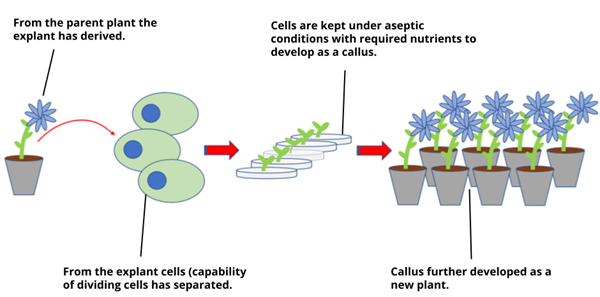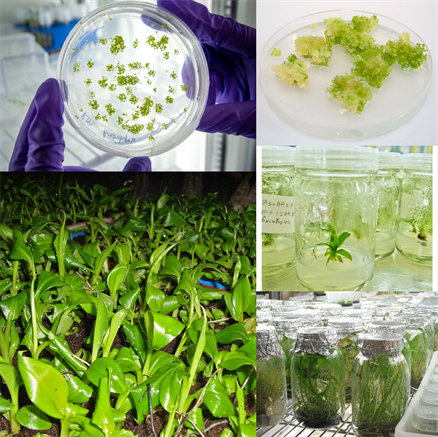PDF chapter test TRY NOW
Micropropagation:
Tissue culture is also known as micropropagation because it is involved in reproducing the plants inside the laboratories.
Plant tissue culture is a separate branch of science as it has the potentiality of each plant cell to grow into a separate organism. This potential of the cell is known as totipotency.
Terminologies:
| Explant: | The part of the plant body was removed for the extraction of cells. |
| Totipotency cell: | The capability of dividing and grow into a whole plant. |
| Callus: | The undifferentiated mass of cells. |

The process of micropropagation
The process of tissue culture:
- The first step is the removal of the explant from the parent plant.
- Afterwards, the totipotent cells are extracted from the explant and allowed to divide under in-vitro conditions.
- For the growth, the cells are given nourishment, consisting of sucrose, vitamins, micronutrients with the plant hormones like auxins, cytokinin, etc.
- The cells divide and develop as a callus, and the callus further divides and grows as small plantlets known as organogenesis.
- Once the plantlets are grown, and they are moved to the nurseries for further growth.

Clockwise from the top:
a. Cell culture
b. Callus formation
c. Plantlets growing from callus
d. Small plantlets
d. Plantlets transferred to nursery
Important!
This technique has made a significant contribution in the field of modern agriculture by producing the most viable plants with many applications.
Advantages and disadvantages of tissue culture:
Advantages:
- The products of micropropagations are called clones because they contain the same genetic pool as the parent.
- Micropropagation is a single parent involved.
- It is involved in rapid multiplication.
- This method is very prominent for seedless plants, such as banana, sugarcane, seedless grape etc.
- By applying molecular-based techniques, we can able to produce disease-free plants for crop improvement.
Disadvantages:
- The propagules are prone to fungal, bacterial or viral infections.
- The variations in the generations will be absent, as they produced by using single parent.
- These plants may degenerate due to the lack of adaptation to the new environment.
Reference:
https://commons.wikimedia.org/wiki/File:Multiplication_de_plants_d%E2%80%99int%C3%A9r%C3%AAt_par_micropropagation_.png
https://www.flickr.com/photos/b_inxee/3794988811
https://upload.wikimedia.org/wikipedia/commons/thumb/0/09/Plant_Tissue_Culture_Lab_-_Atlanta_Botanical_Garden.JPG/512px-Plant_Tissue_Culture_Lab_-_Atlanta_Botanical_Garden.JPG
https://www.flickr.com/photos/doe_jgi/49946260683
https://upload.wikimedia.org/wikipedia/commons/thumb/1/18/Callus1.jpg/512px-Callus1.jpg
https://commons.wikimedia.org/wiki/File:Banana_plantlets_transferred_to_soil_(with_vermicompost)_from_plant_media.jpg
